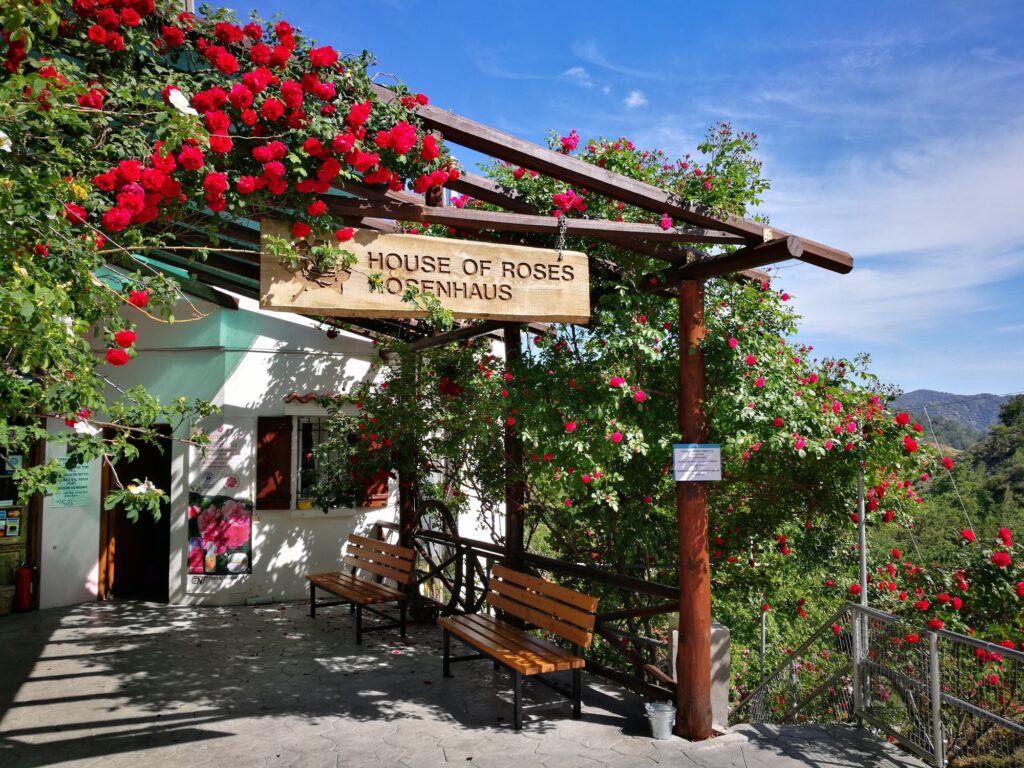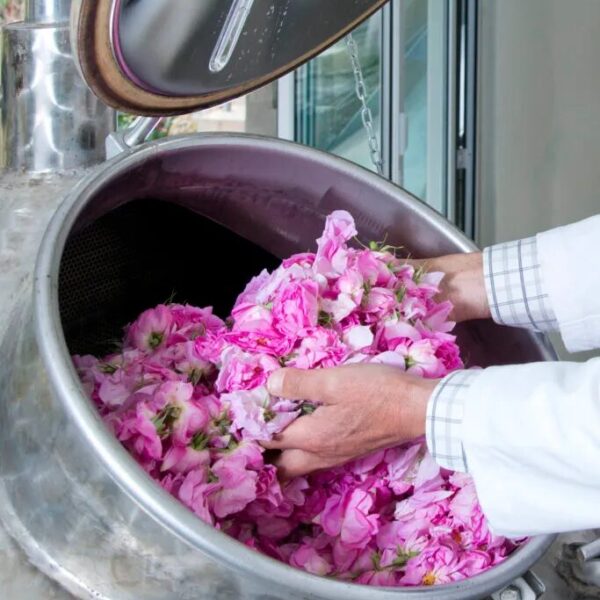For seventy-seven years, the Tsolakis family has been continuing a tradition around roses in Agros. From rose water to organic tea, as well as cosmetics and confectionery, their artisanal know-how and passion for roses have transformed their family business into a success story. Today, the third generation is in place, exporting products beyond Cypriot borders while preserving the agricultural and entrepreneurial values that have made them renowned.
In the village of Agros in the Limassol district, the Tsolakis family has been cultivating roses since 1948, with care and dedication. A century ago, the local schoolteacher, Nearchos Kliridis, saw in the rose bushes growing in the area a new crop, and undoubtedly a new source of income for its inhabitants. Owning a few rose bushes and a still, benefiting from the teacher's knowledge, Nikodimos Tsolakis then embarked on the production of rose water, leaving a lasting mark on the Cypriot market. Now at the helm of “The Rose Factory”, his son Christakis Tsolakis and his granddaughters continue this tradition while innovating every day.
Living by and for the roses
“We are deeply proud to continue a tradition that our grandparents built and that our parents carried on, keeping it alive and strong to pass it on to us, intact and full of values”, emphasizes Andria Tsolakis, a member of the 3rd generation of the family.
“Since I was a child, I remember walking in my father's fields and picking roses early in the morning. For us, they are not just flowers; they are our life. Their scent follows me everywhere. It is truly invaluable to grow up in nature, surrounded by scents and colors, and especially among the roses. As far back as I can remember, I was a child who constantly ran through the factory spaces, among baskets full of roses. Especially in the summer, we actively participated in making the products as well as welcoming tourists who visited the place, gaining experiences from a young age”.
Her integration, along with her sister's, into the business was therefore a natural evolution. Even their studies brought them back to this passion for roses. “After finishing school, I studied chemistry. Then I went to Montpellier in France, where I pursued a master's in cosmetic production, directly linking my knowledge to the family business. Similarly, my sister followed her own path, equally important for the company. She studied economics and pursued a master's in business management, bringing valuable skills in organization and development”, explains Andria.
Hand-picking
Spring is the blooming season, when roses need to be harvested and the raw materials produced that will be used in the following months for making products.
“Without a doubt, May is the most demanding month, but also the most magical for us,” she continues. Everything starts around 5:30 in the morning, so that the essential oils contained in the roses do not evaporate. About 80,000 roses are hand-picked each day. The factory employs eight people, but during the blooming season, there is additional seasonal staff for the duration of the harvest, which lasts from 20 to 30 days depending on production and weather conditions.
The roses must then be used immediately. They are weighed and sorted according to different processes. Most of the flowers are used in the distillery for the production of rose water and rose essential oil. These are the main raw materials, from which The Rose Factory will create syrup, loukoums, chocolates, rose vinegar, jams, candies, ambient fragrances, as well as candles and cosmetics. “A certain amount of roses will also be dried for the production of rose tea,” explains Andria Tsolakis, emphasizing that many visitors flock to experience this up close.
The rose bush is a crop that thrives without needing excessive interventions. The “Rosa damascena,” the species cultivated by the family, has a scent that stands out from its counterparts, to the point that it is now referred to as "the rose of Agros."
“We use gentle cultivation methods, we limit the use of pesticides, and we strive to minimize the impact on the environment. This variety of roses thrives in Agros due to the cold winter and cool summer. These conditions allow it to bloom properly and provide us with roses that have a rich and high-quality scent. Unfortunately, in recent years, we have increasingly noticed the effects of climate change, which is causing drought in the crops,” observes Christakis Tsolakis.
All the way to Australia
In July 1971, the producer initiated the first export of rose water. It was to Australia and Melbourne, which has a Cypriot community nostalgic for the scents of their island. Japan will be the second destination conquered thanks to the collaboration established with their Australian representative. “We want our products to reach more people, both in Cyprus and abroad, and become ambassadors of our country,” he points out. Before emphasizing: “I am very proud to see the company evolve, to see where we have come today.”
The Tsolakis family understands the importance of innovation. Since 2006, to make the most of the precious properties of rose water and rose essential oil, the family has launched the production of Venus Rose cosmetics. The first certified organic cosmetics from Cyprus, they comply with the European Cosmos Organic standard.
In the immediate plans, there is the expansion of the existing factory. And, for the future, the hope that the 4th generation will integrate and continue the saga “to pursue the dream and continue to honor the family tradition for the next 100 years.”

Featured photo: Most of the flowers are used in the distillery for the production of rose water and rose essential oil @venus-rose
